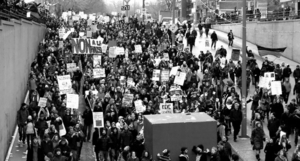Washington,DC - Following the elements of Quebec’s student “strike” during the past 11 weeks has been somewhat equivalent to a TV mini-series, but while sputtering along, it leaves a Washington commentator with a number of observations.
First, it is really not over money. The amount of tuition increase over five (or seven) years is trivial in real terms. Variously, it was been characterized as a latte a day (or a bottle of designer water) in total price. Rather it appears symbolic, even akin to the precursor-stimulus for theAmerican Revolutionary War of a tax on tea. The tax was trivial; the tea remained very inexpensive. The point (and both American colonists and their British overlords recognized the point) was the right of the British to impose such a tax without what the colonists deemed to be appropriate political representation and/or consultation on taxation.
Thus it matters not, other than as a debating point by those opposed to the strike, that the tuition increase would, even when fully implemented, leave Quebeckers paying the lowest tuition for a university education in North America.
Nor was the counter argument by the strikers that the Quiet Revolution committed to making university free other than another debating point. Proposing that university should be free in five years is more a red herring with the dimensions of a crimson whale than a serious argument. In most countries where university education is “free” e.g. (China, Japan, Russia, France, Germany, Scandinavia), the competition for entry is ruthless/relentless from pre-school. For Quebec, however, there is no legacy of “examination hell” and “examination mamas” (or students committing suicide because their academic results precluded university training with failure a family disgrace). Indeed, Quebecker interest in advanced education is hardly commensurate with price.
According to a study by the Higher Education Quality Council of Ontario only 30 percent of Quebec’s youth go on to post-secondary—20 points lower than those in Atlantic Canada. Could participation be low because costs are so trivial that university education isn’t valued?
Indeed, the students with the most difficult areas of study (engineering, science, business) and consequently the greatest prospective financial return on their investment wanted to study but were prevented by the strikers.
 Rather the strike is another manifestation, dare one say metastasis, of the “Occupy whatever” movement that had its media moments last year. The counterpoint is that the Quebec government projects the appearance of being terrified over the prospect of enforcing the law and reestablishing social order. Officials pretzel themselves into absurd rationales when denying that blocking access to buildings and classrooms and intimidating students from entering buildings is not illegal because there was no violence. And who would the officials have blamed if students had pushed through the cordons of strikers, demanding access to classrooms and educators? Having read the stories of individual Canadians arrested while attempting to safeguard their homes or property, it isn’t hard to imagine that students would have been charged with disturbing the peace or comparable inanity.
Rather the strike is another manifestation, dare one say metastasis, of the “Occupy whatever” movement that had its media moments last year. The counterpoint is that the Quebec government projects the appearance of being terrified over the prospect of enforcing the law and reestablishing social order. Officials pretzel themselves into absurd rationales when denying that blocking access to buildings and classrooms and intimidating students from entering buildings is not illegal because there was no violence. And who would the officials have blamed if students had pushed through the cordons of strikers, demanding access to classrooms and educators? Having read the stories of individual Canadians arrested while attempting to safeguard their homes or property, it isn’t hard to imagine that students would have been charged with disturbing the peace or comparable inanity.
It is the refusal—by now perhaps the absolute inability—of Canadian security to protect the rights of those attempting to exercise their rights that is the most disconcerting. We have seen it earlier with idiosyncratic instances of security forces refusing to disperse demonstrators protesting prospective speakers, e.g., Israeli Prime Minister Netanyahu prevented from speaking at Concordia. Indeed, Canadian security seems unable to prevent riotous assaults whether they be the G-8 Toronto Summit or the Vancouver Stanley Cup finale.
We have come a long way as societies from circumstances in which the “Riot Act” could be read to an unruly crowd—and failure to depart within an hour could result in a death penalty. In Canada the Riot Act has been incorporated into the Criminal Code in a modified form. Unlike the original British Riot Act, the Criminal Code requires the assembled people to disperse within 30 minutes. It provides for life imprisonment should the proclamation be ignored. Although the Riot Act reportedly was read in June 2011 to the Vancouver rioters, effects appear to have been minimal.
The point is not trivial. Polls repeatedly indicated Quebeckers rejected violence and the “black bloc” demonstrators. Their desires, however, are ignored by security forces and the government that seems to believe turning the other cheek is a political tactic rather than a religious injunction.
Regardless of the ultimate resolution of the strike, one can be sure that demonstrators of every ilk have learned how to extort the government; their fear of inflicting violence is greater than the pain of enduring it.
I, on the other hand, recall the comment attributed to then French Prime Minister Georges Pompidou when observing the 1968 Chicago riots said, “A society that cannot defend itself will not survive.” His wife then acerbically added, “Nor does it deserve to.”

























Commentaires
Veuillez vous connecter pour poster des commentaires.